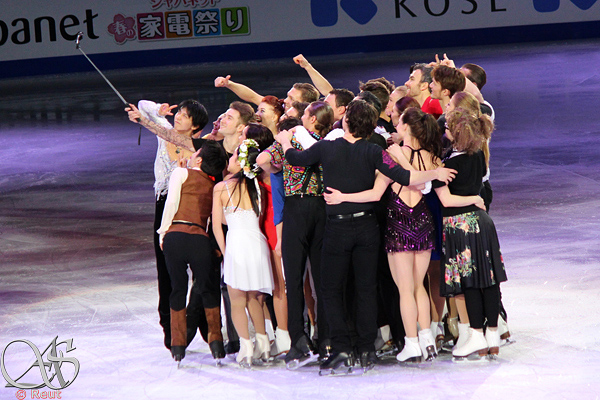Misha Ge: "It's been an amazing journey"
May 1, 2017
By Titanilla Bőd (Új Szó)
Photos © Reut Golinsky, Tamás Róth
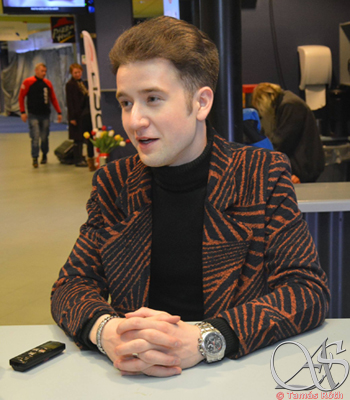 Misha Ge announced that the World Championships in Helsinki might be his last competition and he delivered what might have been the performance of his life in the Hartwall Arena. The crowd was on its feet during his last spin, clapping, cheering, being moved deeply. Later that day I had a chat with Misha and it was a special interview, sitting in an empty corridor during the ice dance competition, discussing past and future, with this strange sense of an ending in the air.
Misha Ge announced that the World Championships in Helsinki might be his last competition and he delivered what might have been the performance of his life in the Hartwall Arena. The crowd was on its feet during his last spin, clapping, cheering, being moved deeply. Later that day I had a chat with Misha and it was a special interview, sitting in an empty corridor during the ice dance competition, discussing past and future, with this strange sense of an ending in the air.
A few hours have passed since your amazing free skate that received a standing ovation. Have the emotions sunk in yet?
It's such an amazing feeling, just the body is really tired. But it's just awesome to have such a performance after we had so many difficulties. When you step on the ice and realize it's your last performance, it's really different from anything before. Thank God I could have such a performance.
What were the biggest difficulties for you?
It was a busy season. I worked as a skater and as a choreographer and had to combine all those things together. I traveled a lot around the world. I also had some problems with my foot, that was probably the most difficult one. But it's hard to be apart for the family, it's hard that my grandma has to be by herself in China, because I'm skating so my dad can't stay with her. There were a lot of things.
How did you manage to arrange your time schedule? To travel and to create programs and still not neglect your own practice?
That was another difficulty. To keep the balance between training, choreography, shows and competing. 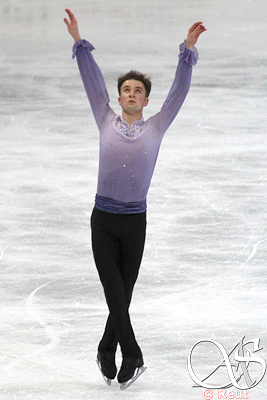 I had to find the perfect balance without it detracting from my practices. That's why it was hard to plan every single day. Every day was precisely calculated. What I've achieved now is the result of lot of planning that my dad made.
I had to find the perfect balance without it detracting from my practices. That's why it was hard to plan every single day. Every day was precisely calculated. What I've achieved now is the result of lot of planning that my dad made.
Do you feel more like a skater or a choreographer?
I'm both. I've done that for a few years, but I'm slowly transferring more into a choreographer, organizer, manager of events and shows.
Has your vision of skating changed since you started choreographing?
It has. It's improving, it's updating, because every person you work with is different and unique. While you work with them, you will learn even more to understand the human body, the movements, the way they understand the music, or express the movements. It's a great progress and process to improve yourself.
What is the biggest challenge for you when you are creating a new program?
When you choreograph for yourself, you know better your body and what it is capable of. I talk a lot with my team, especially my dad, to pick the music and find the thing that we haven't done before, and something that people will enjoy, something beautiful and unique. But when you work with other people, you try to understand what the skater needs, what the coach needs, what they feel, what is good for them, what suits them, what would make them improve. So there are so many different aspects. And because it's not your body, you have to take your time to educate yourself and understand what they are capable of, how good they are at particular stuff. In some cases doing choreography for other people can be more difficult.
Skating is going into a direction that there are more and more quads. How to keep the balance between technical content and artistry?
I've tried to be an all-round skater for all those years. We tried to achieve the technical difficulty but still keep the balance in all-round skating, jumps, spins, transitions, artistry. 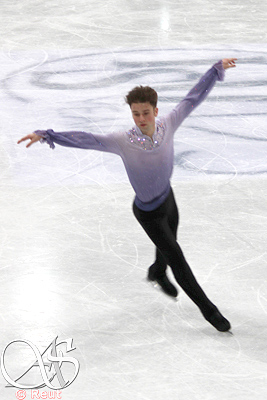 But these days it's become hard. There was the famous quad performed by so many people, but by chasing one thing you might lose another one. The technical aspect has been extremely good now, but we have lost some other things. I wish we still see balanced programs. We do have some amazing people who can do balanced programs, but just a very small amount of skaters are able to do that.
But these days it's become hard. There was the famous quad performed by so many people, but by chasing one thing you might lose another one. The technical aspect has been extremely good now, but we have lost some other things. I wish we still see balanced programs. We do have some amazing people who can do balanced programs, but just a very small amount of skaters are able to do that.
Do you think it's possible to have five or six quads in a program and still keep the artistic side?
It's possible, but it takes time and you have to work a lot for that. And you have to keep in mind that you want to get that goal. Sometimes it's hard when everybody is doing those jumps. You start to chase the majority of skating, and start focusing on technical elements.
You have never stood on a podium in a major competition, but you have won the hearts of the people.
I think I had performances which are worth, for me, more than medals. Those memories, those eyes, hearts, words of the audience, their support, cheering, clapping are just like medals sometimes. Here in Helsinki I had one of those moments. I'm not sure if you can get such feelings from a medal. How people were supporting me and screaming - you feel the feedback from heart to heart. After my program so many people talked to me, said amazing things. I don't say it often, but that's a moment you remember for a lifetime.
How do you manage to control so many emotions? Even watching your programs can be emotionally overwhelming, especially knowing they might be the last ones.
You have to train (smiles). It is not easy to find the balance, sometimes it takes years.
What do you consider are your biggest achievements?
Olympics. It was a great skate, the best I could've done at that time. Also Shanghai Worlds in 2015, sixth place, and today. Those are the performances I'm the proudest of.
Next year it's Olympics again and you've just earned the spot for Uzbekistan. Do you still plan to finish your career? 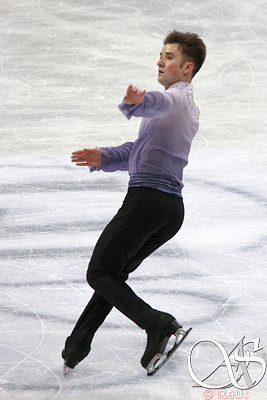
We will think about it. We are going to take time to consider and understand a lot of things. Lot of people do want us to perform, but they see only the bright side, they don't see the difficult side. Behind that there are a lot of difficulties for the family. Also we are working to create the future path of my career - that's what we are also focusing on these days.
You said that you already have ten confirmed skaters that you will work with next season. Can you reveal some names?
I will be in U. S., Russia, Korea, Japan and China. But to respect their plans I have to keep secret the names. For some people I will make show numbers, for some competition programs. Maybe also Olympic programs.
Do you like to create more show numbers, because you have more freedom?
No, it's different. They are both good. In show numbers you have more freedom, but it's also good when you create competition programs, that the people will fight with. Each of them has their beauty.
This season you created the short program of Anna Pogorilaya. It was a little masterpiece...
No, not a masterpiece! But getting all that feedback I'm glad that it was a fine work.
And how do you feel when you are watching your choreography?
One day I was watching Anna doing her short program, and the next day I was skating my own short... I just thought this was quite unique, you are an active skater and you are watching your art on the ice, and you get a standing ovation. But there was an even funnier story. This year I did programs for Alexander Petrov and Artur Dimitriev, and I competed against both of them at two Grand Prixs! And both of them were in the same group for practice. At Skate Canada me and Alexander Petrov had back to back starting numbers. Once I was skating by at practice, listening to the music that I cut, looking at the choreography I've done, and I was just smiling: "The next is my program, but this is my program, too!" At the competition he skated after me, and the commentator said: "It would be really funny if Misha sat next to Mishin and Petrov, 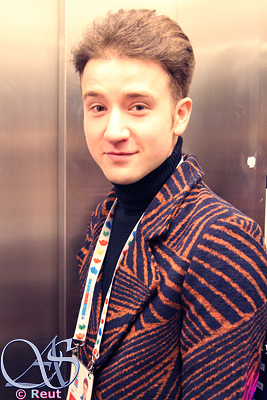 but still in the costume, sweating, and talking to his skater like you have to do this, you have to take care of this line, you have to do that pose..." That would have been really funny.
but still in the costume, sweating, and talking to his skater like you have to do this, you have to take care of this line, you have to do that pose..." That would have been really funny.
Are you strict with your students?
I try to be balanced. I try to respect them, I try to be nice, but when the work has to be done, it has to be done. No excuses, just go and do it. So I try to balance between softness and stiffness.
Mental strength is important for skaters. How do you work on it?
Sometimes you talk with different coaches, mentors, psychologists... You learn little by little to gain those things altogether, how to use them and find the thing that helps you. Mental things can be different for everybody, even the way how they set themselves up to a competition, or the way they think during the performance. So you have to find the one that is good for you. It takes years.
Do you have a favourite program?
I'll say that pretty much all are favourites. Because when we pick the music we pick something the people will understand and enjoy and also something that you feel you can do from the heart. We choose very carefully, that's why pretty much every program is a favourite. But Ave Maria was one of those heart-paining but real programs that was showing a piece of my life.
Do you have any dream that never came true?
I wasn't the skater who was chasing those huge fantasies. My parents taught me since I was little to look on everything very realistically. To see what I'm capable of, what I can do. I always tried to achieve little by little. I would say we achieved more than we wanted. I appreciate that my parents led me to what I am today.
If little Misha met the current Misha, would he be satisfied?
I think he wouldn't believe it where I am right now. Of course I hoped I would be skating, but to get to this level, with that much fan support, so many achievements in 25 years... I would have not believed it. It's been an amazing journey.
